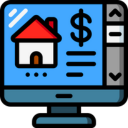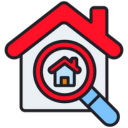Real Estate CRM Software Development
Our real estate CRM software development company has expertise in crafting innovative, user-friendly solutions to revolutionize property, client, and transaction handling for businesses. Our team of experienced real estate CRM software developers craft personalized software that improves operations, enriches customer experiences, and accelerates efficiency. Whether you’re an investor, agency, or realtor, we offer next-generation technology solutions to enable you to lead in the constantly evolving real estate realm.
Your Tech-partner in real estate CRM software development
With 12+ years of experience in developing real estate CRM software, we have established a robust team of 150+ seasoned developers, having a track record of delivering 500+ successful projects in 20+ countries. Your go-to tech partner, we develop scalable, user-friendly, and feature-packed CRM solutions aimed at optimizing property management, automating operations, and enhancing client experiences. Our advanced technology enables real estate companies to remain competitive, increase efficiency, and achieve long-term growth.

Let's hire Freelance CRM developer for Your Project!
Features of our real estate CRM software

Multi-channel communication
Stay in touch with your customers via emails, SMS, WhatsApp, and in-app messaging, all from one platform. Our CRM provides for seamless multi-channel interactions, keeping your communication well-organized and responsive.

Marketing
automation
Automate your social media posts, follow-ups, and email campaigns to attract buyers easily. With our CRM, you can engage leads with custom content and raise conversions without exerting effort.

Project
Management
Monitor your real estate projects from start to finish using easy-to-use dashboards. Allocate tasks, track progress, and automate workflows to keep your team synchronized and projects on track.

API Integration &
Development
One can connect real estate CRM and lead generation tools with third-party applications to streamline workflows. Powerful API integrations for accounting, IDX websites, and even text messaging ensure an interconnected and efficient business ecosystem.

Full
customization
Customize the CRM to fit your business requirements with custom fields, workflows, and dashboards. From single agent to big agency, our adaptable system is designed to suit your specific needs.

Contact
management
Store all client information, communications, and transaction history in one location. With our intelligent tagging and segmentation, it is simple to locate, handle, and cultivate relationships with buyers, sellers, and investors.

Sales
management
Optimize your sales pipeline with auto-assignment of tasks, deal management, and real-time tracking. Have complete visibility into each stage of the sales process to close deals in record time.

Lead
management
Efficiently capture, score, and prioritize leads with Artificial Intelligence-driven insights. Automatically route leads to the appropriate agents and monitor their path from inquiry to conversion.

Reporting and
analytics
Make informed decisions using real-time sales performance, lead source, and customer interaction reports. Our CRM offers customizable dashboards that present you with a rich understanding of your business progress.
Feature-Rich Panels of our Real Estate CRM Software Solutions
Admin Panel


System Settings

Data Security

Audit Logs


Integration Management

Reporting and Analytics

Workflow Automation
Agent Panel








Client Panel

Property Search

Appointment Scheduling

Document Access

Communication Portal

Personalized Recommendations

Transaction History

Feedback and Reviews

Secure Login
From Leads to Loyalty :How CRM Powers Realtor Success ?
Creating a profitable real estate firm isn’t necessarily a matter of coming across leads, it’s closing them as a repeat client forever. That’s when a powerful CRM (Customer Relationship Management) platform comes into use. With the right CRM, realtors can manage every communication, cultivate connections, and personalize experience that garners trust. Whether it is sending automated follow-up messages, delivering customized properties as recommendations, or memorizing landmark customer dates like their birthdays or their anniversaries, CRM enables realtors to stay tuned in and manage. More than an instrument of sales, it turns browsing inquiries into loyal buyers and happy homeowners into avid referrers. In a competitive environment, the right CRM doesn’t simply handle contacts, it builds loyalty, enabling realtors to take one transaction and turn it into a lifetime of business.

Types of real estate CRM software we offer

All-in-one
real estate CRM
Our single-platform real estate CRM is built to simplify every process in your real estate business, from lead generation through closing transactions. It integrates contact management, marketing automation, transaction management, and client communication within a single unified platform. You're an agent, broker, or investor; this CRM organizes everything for you and keeps it accessible in one place.

Real estate
brokerage CRM
Designed exclusively for real estate brokerages, our CRM is used to manage teams, monitor agent performance, and simplify transactions. Equipped with features of lead distribution, commission tracking, and auto-reporting, brokers can easily monitor their whole operation. It also encourages teamwork so that agents and admins are in sync for enhanced productivity.

Real estate
agent CRM software
Our real estate agent CRM streamlines client communication, follow-ups, and deal tracking. It provides intelligent reminders, automated drip campaigns, and a mobile-responsive interface so agents can cultivate leads while on the move. With in-built analytics, agents can monitor their sales pipeline and fine-tune their approach for improved conversions.

Property
management CRM
For property managers, this CRM provides a way to monitor tenants, leases, repair requests, and financial transactions. It streamlines rent collection, reminds users when it's time to renew the lease, and syncs with accounting software to make management stress-free. Manages a small portfolio or large portfolio, the system makes efficiency and tenant happiness possible.

CRM for
real estate investors
Real estate investors require a CRM that assists them in handling leads, monitoring properties, and evaluating investment opportunities. The software provides deal tracking, financial modeling, and automated follow-ups with prospective sellers. It also connects with market data sources to enable investors to make informed decisions easily.

Niche-specific
real estate CRM
For individuals servicing niche markets such as luxury properties, vacation property rentals, or commercial properties, we have industry-specific CRMs designed with you in mind. These plans are equipped with specially designed workflows, focused marketing applications, and market-specific integrations to best suit your achievement within your own specialty market segment.
We offer the latest technologies in our in our real estate CRM software solutions

AI and ML
Our real estate CRM uses AI and machine learning to automate processes, forecast market trends, and personalize customer experiences. These technologies enable agents to make informed decisions and enhance lead conversion, and client engagement.

Blockchain
We incorporate blockchain to improve data security, avoid fraud, and facilitate property transactions. Smart contracts guarantee transparency and efficiency, making property buying, selling, and leasing more trustworthy.

Cloud Computing
Our cloud CRM enables real estate professionals to access information at any time and from anywhere. It facilitates effortless collaboration, expandable storage, and greater security, boosting productivity and efficiency in property management.

AR/VR
With AI-powered chatbots and virtual assistants, our CRM improves customer service through prompt responses and automation of repetitive inquiries. Machine learning constantly optimizes recommendations for clients, increasing engagement and sales.

Data Analytics
Our CRM solution offers in-depth insights into customer behavior, property trends, and market conditions. Through real-time analytics, agents can fine-tune pricing strategies and marketing campaigns, getting ahead of the competition.

IoT
We implement IoT to make property management intelligent with real-time energy consumption, security, and maintenance monitoring. This provides homeowners, tenants, and property managers with a seamless experience.
What makes Next Olive unique in real estate CRM software development?
Next Olive stands out as a Custom CRM development company through the provision of innovative and bespoke CRM for real estate solutions with a high focus on timely delivery and hassle-free execution. End-to-end communication sees clients remain updated at all times, leading to transparency and trust in the development process. Through client-oriented methodologies, we focus on individual business requirements, developing CRM for real estate that boosts efficiency and user experience. Our organized work process, specified by well-delineated project milestones, ensures seamless progress and quantifiable output, making them a trustworthy collaborator for property companies looking for innovative CRM systems.

Reviews from Our Clients



Different Industries We Serve In

Hotels and Restaurant




Architecture

Sports

Information Technology

Gaming

Construction

Fintech

Taxi booking

Hospitality

Petroleum

Real Estate

Fitness

Fashion and Beauty
Our Real Estate CRM software Development process
Need Analysis and Requirement Gathering
To start developing a CRM system for realtors, the specific needs of a real estate business need to be known. Each company differs either in being residential or commercial and varies in their workflow. The development team works together with the stakeholders to define what must be included in the system, such as contact management for real estate agents, lead generation, IDX integration with real estate websites, and CRM software property management. It is all about building a tailored solution that heals the operational pain of a business, but it scales and is flexible.
UI/UX Designing
The CRM will also rely on the user experience built during production. In other words, real estate CRM software has to be easy to use intuitive and friendly, and designed for agents, property managers, and other teams. It must concentrate on designing an effective and stylish interface through which users can access the main features- real estate CRM lead management, real estate client management software, and listings within a short period.Whatever it is, either real estate CRM standalone or WordPress-based real estate CRM the design here ensures clean and great experiences across the desktop and mobile.
Core Features Development
Following these, the core functionalities of CRM software implemented in the real estate sector have to be developed. There are features such as
Advanced Lead Management: Tracks leads from any source and keeps the agents on top of all follow-ups and conversion opportunities.
Tasks & Activities Management: Automatic reminders, follow-up tasks, and calendar scheduling so nothing falls through the cracks.
Client Communication: The integration with email, SMS, and text messaging allows an agent to communicate directly with a client without leaving the CRM. A real estate CRM that contains text messaging will also allow for real-time communication.
Reports and Analysis: Performance measuring reports customized and KPI tracking reports on sales, clients acquired, and leads converted.
Automation: The salesperson’s repetitive tasks like sending out emails or making appointments are done, so the person can dedicate themselves to closing deals.
Testing and Quality Assurance
The testing is done even before the go-live date of the CRM software. It checks on functionality, security, and usability. All the features are tested by the quality assurance test so as to determine whether the real estate CRM program is actually workable in a multi-device and browser compatibility setting. For example, when developing a cloud-based CRM in real estate, it tests the compatibility between mobile devices and desktop systems. This stage will also include security tests, as the protection of a client’s data in real estate transactions is fundamental.
Deployment and Integration
Once the software has been tested, it is ready for deployment. In this phase, the development team is to ensure that it will easily fit well with the other existing systems which can be a property management platform, listing services, or even an email marketing tool. Whether it’s a CRM and website solution for real estate or a standalone CRM, it must integrate seamlessly with the tools that real estate professionals already use. This might be IDX (Internet Data Exchange) integration if the websites are involved with IDX and CRM in terms of keeping real estate data updated while directly accessing the CRM.
User Training and Onboarding
Realtors should feel comfortable and confident in the use of the new CRM system to take full benefit from the new system. A development team has offered comprehensive training materials, which would include webinars, video tutorials, and manuals on everything from contact management of real estate agents to a more complex feature like lead nurturing automation. It would train users to use everything the real estate CRM software has in store. This, in turn, would help in increased adoption rates and also cut down on the learning curve.
Post-Deployment Support and Maintenance
After the launch of the CRM, technical problems or user complaints would arise that require support. Maintenance is the service that needs to be offered by the development team; it could include bug fixes, updates, and even improvement of performance. Since the real estate industry has to keep changing according to the environment, Therefore, the software should be regularly updated with features and compliance with the newest regulations. Holding on to the recent addition and the subsequent changes perhaps in features added like CRM in real estate or enhancements from real estate CRM lead management, will keep the application relevant.
Our Technology Stack
Frontend Development
Languages

Kotlin

Java

Swift
Frameworks

Android SDK

Jetpack

Flutter
Backend Development

Vue. Js

React.JS

Python

AngularJS
Tools






Hosting & Storages
Cloud Hosting



Database



Design and Prototyping Tools






API & Integrations






Frequently Asked Questions
The top 10 CRM for real estate are:
- Zoho CRM
- Next Olive Custom CRM
- Salesforce
- SAP
- Pipedrive
- Freshsales
- Wise Agent
- LionDesk
- HubSpot Sales Hub
- Realvolve
Depending on the project’s complexity and requirements, development might be longer or shorter than average. For example, a real estate CRM system completely takes 3 to 6 months but, when it comes to solutions with a higher complexity like integration which may be IDX, MLS, or third-party apps, then that time duration is long. It goes through these development stages: planning, design, coding, testing, and deployment. Clear communication with your development team can ensure the project stays on track and meets your business needs.
A real estate CRM and website combo offers agents a solid platform for managing clients and presenting properties. It allows for automatic lead capture, easy communication with clients, and a professional web presence. Integration will ensure that all client data, inquiries, and interactions are kept in one place, thus enabling the agent to work more efficiently and provide better services to clients.
While commercial real estate CRM is designed to address all of the needs of commercial real estate agents, many of the top real estate CRMs offer features that can also be customized for residential purposes. The features of a CRM that can track leads, manage properties, or schedule meetings are universal for all types of real estate.
For those looking for an easier option, a CRM may be something streamlined to meet those needs, maybe even Zoho CRM or Freshsales. These CRMs are pretty friendly in interface with all of the key components within contact management, email marketing, and task tracking, without having to worry about overhead related to enterprise-level systems.
The actual cost to develop a fully custom real estate CRM application may run from several thousand dollars, such as a minimum configuration of around $10,000 to a very significant sum of more than $100,000 for an all-customized version, depending upon the intricacies of features, the sophistication of your development team, and size of your business. Added features, such as the availability of IDX, mobile, and higher-end automation functions increase the cost. When thinking in terms of budget for real estate CRM software development, it is important to weigh short-term costs against the long-term benefits of improved lead conversion and operational efficiency.
Some of the top 10 CRMs for real estate in 2025 include Propertybase, LionDesk, and Follow Up Boss. These solutions provide fully packed features, such as automation of tasks, division of customers, and even very strong reporting. They facilitate the management of client relationships by closing more deals for real estate professionals; that is why they can become a top choice for any agency or independent agent.
A real estate website, that integrates IDX and CRM, is one that offers the agent and the client a seamless experience. Through IDX integration, real-time MLS property listings are easily shown on the website, whereas CRM integration helps agents in the effective management of such leads. This creates an automated workflow from lead capture to follow-up, leading to better customer engagement and conversion rates.
Real estate CRM programs ensure that the leads are captured, fostered, and taken down through automated follow-ups on every lead, personalized marketing to email, and landing pages. The real estate lead CRM tools automate the whole process of lead management; they are time-tracked, allowing for quick subsequent follow-ups, which creates a high chance of converting the lead into a client.
CRM for real estate has special features in it specifically addressing the requirements of real estate companies, which is not so found in normal CRM software. General CRMs can take care of contact management and sales follow-ups; the real estate CRMs consist of additional features that range from integration with the Multiple Listing Service, support of IDX feeds, listing properties, and managing open house events.
Based on various business needs, the best real estate CRM has varied over time; however, top-tier ones include Salesforce, HubSpot CRM, and Real Geeks. These CRMs are ranked the highest for ease of use, flexibility, and scalability, which enable agents to grow their business with a good customer service management system.
Indeed, lots of CRM software solutions for agents would integrate with popular applications including Gmail, Outlook, Google Calendar, and even social networks to ensure that agents could do all their contact management as well as scheduling in one place with fewer app switches.
Some of the best-rated features of real estate CRM software include contact and lead management, automated email marketing, task scheduling, document management, mobile access, and IDX integration. These will ensure that real estate professionals can maintain contact with customers and stay organized with all of these different platforms, ensuring increased customer satisfaction and business growth.
This CRM technology automates most deals when it comes to leads, contact follow-up, scheduling, even communication. For example, this may divert the interest of estate agents to deal closure instead of troubling themselves with dealing tasks taken over alone. Therefore, real-time data along with reporting in the CRM for the real estate industry will ensure enhanced efficiency and no missed opportunity.
CRM in any real estate agency serves towards efficient management and analysis of customer contact, smooth day-to-day activity, and enhancement in communication with clients. A good CRM for the realtor or even the investor would help manage leads on that platform, reduce the number of workflows thereby automating the workflow and provide the ultimate enabler of more successful deals and revenue.
Get a Free Proposal for Your
Dream
project
Innovate and Elevate with Us!
Contact Info:
Office Address:

C-80, Tiwari Tower, Sector- N Aliganj, Lucknow, 226022, India

2400 Pkwy, Irvine, CA 92645, United States









